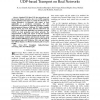Free Online Productivity Tools
i2Speak
i2Symbol
i2OCR
iTex2Img
iWeb2Print
iWeb2Shot
i2Type
iPdf2Split
iPdf2Merge
i2Bopomofo
i2Arabic
i2Style
i2Image
i2PDF
iLatex2Rtf
Sci2ools
109
click to vote
ADT
2006
2006
Characterization and evaluation of TCP and UDP-based transport on real networks
Standard TCP (Reno TCP) does not perform well on fast long distance networks, due to its AIMD congestion control algorithm. In this paper we consider the effectiveness of various alternatives, in particular with respect to their applicability to a production environment. We then characterize and evaluate the achievable throughput, stability and intra-protocol fairness of different TCP stacks (Scalable, HSTCP, HTCP, Fast TCP, Reno, BICTCP, HSTCP-LP and LTCP) and a UDP based application level transport protocol (UDTv2) on both production and testbed networks. The characterization is made with respect to both the transient traffic (entry and exit of different streams) and the steady state traffic on production Academic and Research networks, using paths with RTTs differing by a factor of 10. We also report on measurements made with 10Gbits/sec NICs with and without TCP Offload Engines, on 10Gbits/s dedicated paths set up for SC2004.
Related Content
| Added | 10 Dec 2010 |
| Updated | 10 Dec 2010 |
| Type | Journal |
| Year | 2006 |
| Where | ADT |
| Authors | Roger Les Cottrell, Saad Ansari, Parakram Khandpur, Ruchi Gupta, Richard Hughes-Jones, Michael Chen, Larry Mcintosh, Frank Leers |
Comments (0)

